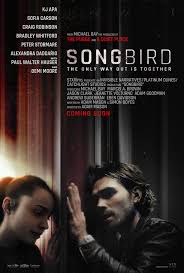Pandemic production is exploitive and bland


The process of making “Songbird” has to be more entertaining than the film itself. Jumping at the chance to roll cameras and grab headlines, “Transformers” producer Michael Bay touted this project as the first production to shoot in Los Angeles after the pandemic shutdown. And the rushed nature of his effort is crushingly evident.
“Songbird” takes place in 2024. COVID-19 has mutated, leaving a large portion of the world’s population at grave risk. Martial law reigns supreme as those infected are taken to quarantine camps known as “Q-Zones,” where, presumably, they die. We never see the inside of this walled-off, heavily policed encampment.
Not everyone is susceptible to the constantly changing virus. Nico (“Riverdale’s” K.J. Apa) is an immune, young bike courier who rides the streets delivering packages to folks barricaded in their homes. His immunity gives him freedom but also leaves him alone. The once-great Western metropolis is mostly empty. We get shots that remind us of 2007’s “I Am Legend.”
Luckily for Nico, one of his clients is a beautiful artist named Sara (Sofia Carson), and the two strike up an awkward romance. Because Sara cannot leave her apartment, the potential lovers can’t physically meet one another. But when Sara’s grandma becomes infected and shady government forces threaten to take her to a Q-Zone, Nico has to save her. I suppose neither cares about potentially spreading the virus by breaking quarantine.
“Songbird” is a graceless, sensationalized projection of current real-world events. Some viewers may find that it cheapens and exploits the present, disheartening coronavirus pandemic. The narrative’s overly sanctimonious, thin gloss delivers no weight, and the action elements are bland and straight out of the Bay handbook (there’s even a patented 360-shot at a critical moment).
Read the rest of Jonathan’s review online and in print in the Times-Herald: https://times-herald.com/news/2020/12/songbird-pandemic-production-is-exploitive-and-bland
